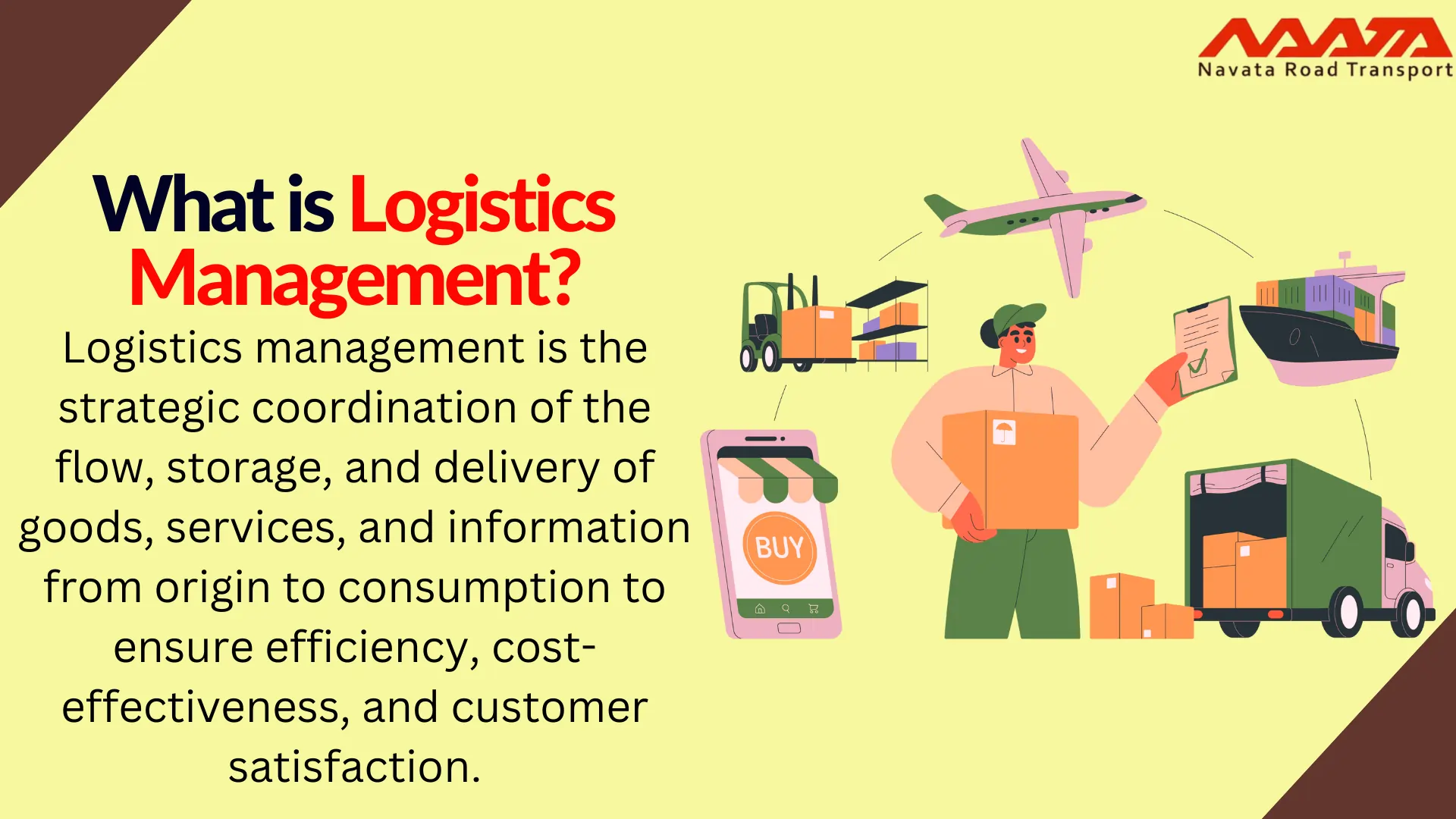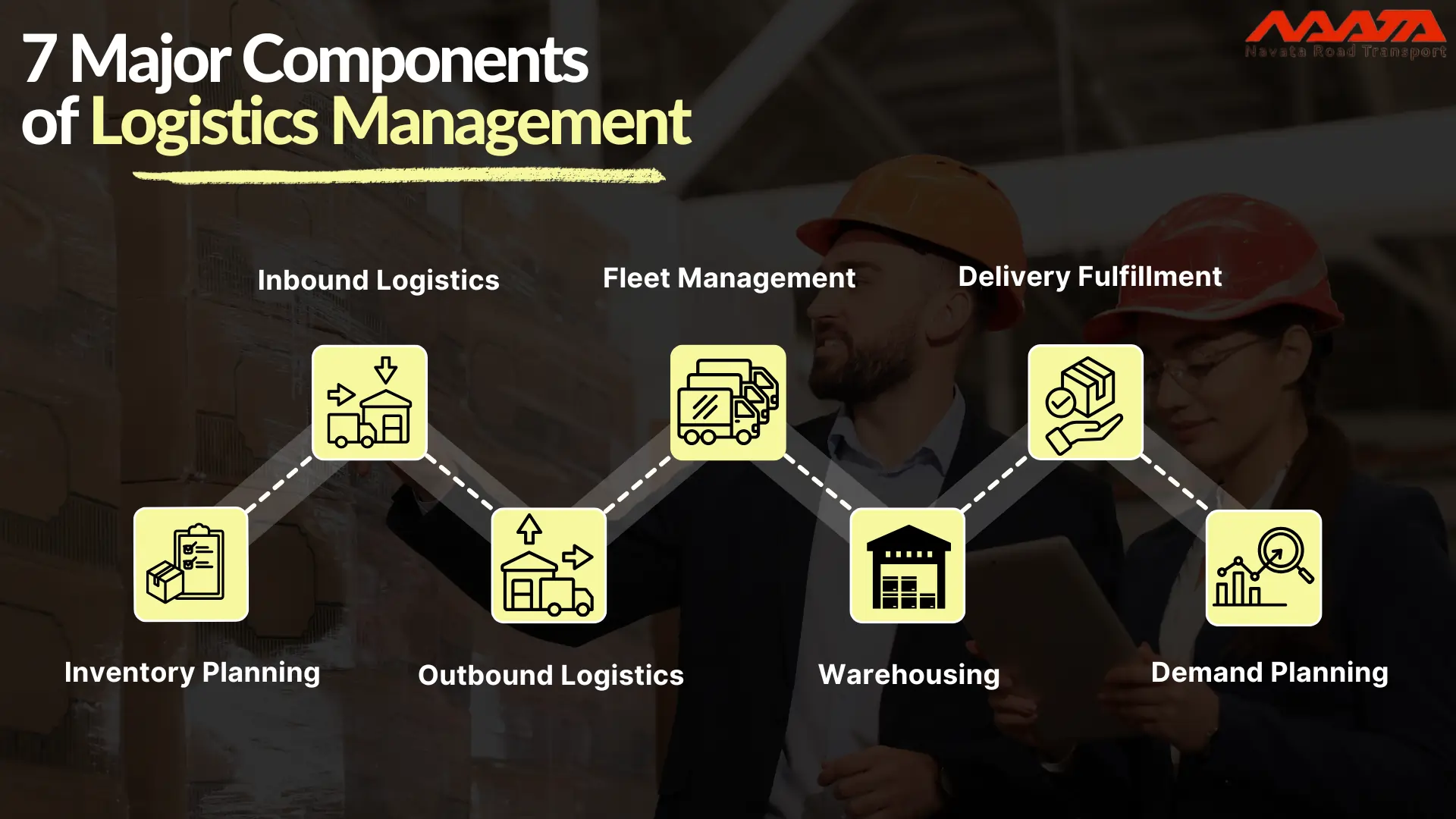Logistics Management: What It Is & Why It’s Crucial for Business Success
Table of Contents
What is Logistics Management?
Logistics management is the planning, implementation, and control of the smooth flow and storage of goods, services, and information—from the point of origin to the final customer.
- Manages goods flow from raw materials to end consumers
- Ensures efficient storage, handling, and transportation
- Balances customer demand with cost-effective operations
- Coordinates inventory, shipping, labor, and data tracking
- Focuses on reducing delays, costs, and waste
- Aims to maximize customer satisfaction and business efficiency
Understanding logistics management is essential for success in the supply chain and logistics industry. It’s all about delivering the right product, at the right time, in the right condition—efficiently and economically.

What Are the Different Types of Logistics Management?
The logistics management process is a comprehensive journey, starting with the acquisition of raw materials and culminating in the delivery of finished goods. Various types of logistics are associated with different supply chain operation, each playing a vital role. The main types of logistics management include:
1. Supply Management: This involves planning, procuring, and coordinating materials to ensure they are available at a specific location and time to support production. It includes coordinating storage and transportation of materials and evaluating supply levels to match demand for a smooth process flow. Timely handling of supply management is crucial to avoid disruptions in the entire supply chain logistics.
2. Distribution and Material Handling: This type focuses on moving stored materials or products for further manufacturing or distribution. It encompasses a lot of loading, unloading, tracking, and inventory keeping. This management controls the movement of supplies from a central warehouse to various other locations, with timely delivery being a critical factor due to intense material movement.
3. Production Management: Production management in logistics involves the planning, management, and control of different production stages within a logistics company. It ensures coordination in manufacturing or assembling, movement between factories and warehouses, managing production spaces, and adhering to strict schedules. Production logistics is key to achieving capital efficiency.
4. Customer Service Management: This refers to the practices, strategies, and technologies companies use to manage and analyze customer interactions and data throughout the customer lifecycle. In logistics, good customer service management relies on excellent communication and timely, damage-free deliveries, improving business relationships and assisting in customer retention.
5. Returns Management (Reverse Logistics): This involves managing items returned to the company. Reverse Logistics encompasses the reclamation of materials and supplies from a production or assembly process, or the return of damaged, unwanted, or unused products from the end customer. Proper inspection and sorting of returned products can significantly reduce losses by allowing undamaged/unused items to be restocked.
What Are the Major Components of Logistics Management?
Logistics management involves a vast network of suppliers, agents, freight forwarding providers, distributors, packers, and service providers, utilizing various modes of transport. It is a complex process that includes multiple components that determine the effective movement of goods. This illustrates how does logistics management work across various functions.
1. Inventory Planning
- Maintains optimal stock levels
- Ensures accurate order fulfillment and reduces storage costs
- Boosts warehouse efficiency and saves time and money
2. Inbound Logistics
- Manages receiving, transport, and storage of goods from suppliers
- Improves procurement, reduces costs, and enhances production timelines
3. Outbound Logistics
- Handles delivery of finished goods to customers
- Includes warehousing, distribution, transportation, and last-mile delivery
- Vital for strong customer relationship management
4. Fleet Management
- Oversees vehicle operations to reduce risks and costs
- Increases delivery efficiency and supports logistics scalability
5. Warehousing
- Stores goods and raw materials efficiently
- Proximity and capacity are key for optimizing logistics performance
6. Delivery Fulfillment
- Ensures timely delivery from point of sale to customer
- Enhances customer satisfaction and supports the ‘perfect order index’
7. Demand Planning
- Demand forecasting helps predict future product demand and sales trends
- Balances inventory levels, revenue goals, and resource planning

You May Also Like To Read: How Logistics Functions ? 6 Major Functions of Logistics
What Are the Benefits of Logistics Management?
Businesses need to implement effective logistics management to remain competitive and ensure stability. Proper logistics management ensures that businesses can meet both demand and consumer expectations. This highlights the compelling logistics advantages for any enterprise.
Improving Customer Experience
Efficient logistics management ensures fast and reliable service, reducing delivery delays and enhancing customer satisfaction. A seamless logistics strategy boosts brand reputation and builds customer loyalty.
- Ensures timely and accurate deliveries
- Minimizes disruptions in transportation
- Enhances customer satisfaction and brand trust
- Adds value to the end-user experience
- Drives repeat business through better service
Optimizing Operational Costs
With increased transparency and data-driven decisions, logistics management helps optimize routes, fuel usage, and resource allocation, leading to significant cost savings.
- Enables route optimization to cut fuel costs
- Reduces unnecessary inventory holding
- Improves resource and asset utilization
- Enhances operational efficiency
- Lowers overall logistics expenses
Boosting Profitability
Effective logistics management enhances visibility, improves order fulfillment, and reduces excess inventory. Leveraging technology and maximizing fleet usage contributes directly to higher profit margins.
- Increases order fulfillment rates
- Reduces stock holding and warehousing costs
- Improves supply chain synchronization
- Uses technology for smarter logistics
- Maximizes fleet utilization for better ROI
Better Intermodal Operations
Intermodal logistics uses multiple transport modes with standardized containers, reducing handling risks, costs, and environmental impact while improving safety and reliability.
- Combines road, rail, sea, and air for efficiency
- Uses secure, standardized containers
- Cuts down handling and damage risk
- Lowers transportation costs and emissions
- Provides reliable and scalable shipping options
What Are the Best Tips for Effective Logistics Management?
Efficient logistics management ensures a smooth flow of communication and products, builds better customer relationships, and minimizes the need to maintain excess inventory. It also helps to reduce errors, shrink delivery times, and increase revenues. These are crucial aspects of successful logistics operations.
- Improves Communication & Flow: Ensures smooth product movement and clear communication, enhancing customer relationships and reducing excess inventory.
- Enhances Control & Visibility: Integrates departments for real-time tracking and better control over ground-level operations, helping prevent disruptions.
- Optimizes Inventory Placement: Positions inventory closer to customers to speed up deliveries while minimizing costs.
- Automates Core Tasks: Automation in scheduling, routing, and task allocation reduces errors, saves time, and boosts efficiency.
- Enables Smart Routing: Uses advanced routing systems to factor in traffic, weather, and other variables, cutting delays and transport costs.
- Improves Last-Mile Experience: Offers customer-friendly delivery options like flexible time slots and real-time order tracking.
- Reduces Carbon Emissions: Leverages route optimization and paperless systems to lower the environmental impact of logistics.
- Measures 3PL Performance Accurately: Digital tools enable data-driven monitoring of third-party logistics (3PL) partners for better service and compliance.
- Strengthens Risk Management: Adopts digital solutions to reduce theft, damage, and delays, boosting supply chain resilience and trust.
You May Also Like to Read: What is Route Optimization Software
Why Is Logistics Management Important?
The increasing complexity involved in the movement of goods from the point of origin to the point of consumption has made logistics management critical for keeping up with changing customer needs, growing competition, and evolving market dynamics. Logistics is key to utilizing, planning, implementing, and controlling the flow and storage of goods and services to meet customer requirements. This highlights the significant logistics importance.
Streamlining Operations: Logistics management is the backbone of the supply chain. It streamlines different processes, from procurement to e-commerce fulfillment, by reducing costs and maximizing resource utilization for any business.
Enhancing Customer Satisfaction: In today’s digital world, customers expect much better service. If products aren’t delivered on time, it can adversely affect the customer. Good logistics management ensures timely order delivery by coordinating activities like warehousing and transportation. This is one of the key benefits of logistics.
Mitigating Risks: Logistics management isn’t just about moving goods; it’s about navigating challenges during storage and transportation. Logistics professionals identify threats like natural disasters and adopt strategies to safeguard goods and products.
Driving Business Growth: Good logistics management can effectively help a business grow. It enables a company to enter new markets or expand its product offerings. This demonstrates the profound impact of logistics on business.
Improving Warehouse Management: A well-organized warehouse is crucial for logistics operations. Proper warehouse management can track and manage goods efficiently, dramatically improving customer satisfaction.
Proper Route Planning: Effective logistics management optimizes transportation routes, ensuring timely order delivery. This involves analyzing various tools and techniques, such as WMS, GIS, TMS, and vehicle routing software, to choose the most efficient approach.

Conclusion
Effective logistics management is no longer just an operational detail; it’s a strategic imperative for modern businesses. By mastering the planning, implementation, and control of your supply chain’s flow—from raw materials to final delivery—you gain immense advantages. Optimizing operations, reducing costs, mitigating risks, and significantly boosting customer satisfaction are direct outcomes. Embracing smart logistics ensures your business not only meets today’s demands but also builds a robust foundation for future growth and sustained competitive edge.
Thanks For Reading: Understanding Logistics Management
Powered By 360Presence




